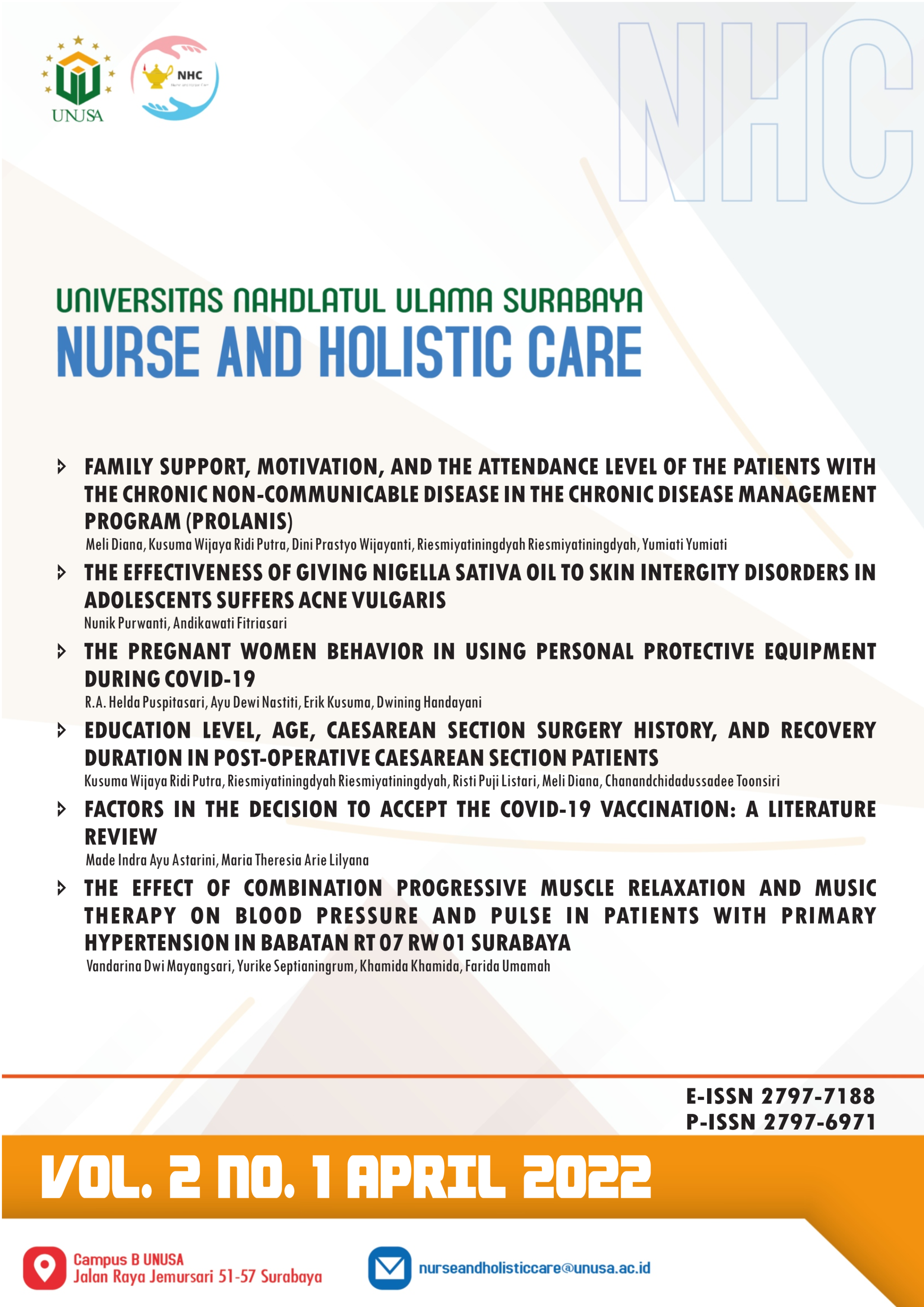FAMILY SUPPORT, MOTIVATION, AND THE ATTENDANCE LEVEL OF THE PATIENTS WITH THE CHRONIC NON-COMMUNICABLE DISEASE IN THE CHRONIC DISEASE MANAGEMENT PROGRAM (PROLANIS)
##plugins.themes.bootstrap3.article.main##
Abstract
Background: The quality of life of people with chronic non-communicable diseases can be improved by establishing the Chronic Disease Management Program (PROLANIS). Many factors may affect the presence of chronic non-communicable disease sufferers in PROLANIS activities, including social support, motivation, level of knowledge, work, and others.
Objective: This study aimed to analyze the relationship between family support, motivation, and the attendance level of patients with chronic non-communicable diseases in the PROLANIS.
Methods: The research design used in this study is an analytical descriptive with a cross-sectional approach. The research was conducted from August 2020 to February 2021 at the FKTP Clinic DKT 02 Sidoarjo. The target population in this study were all 55 members of PROLANIS registered at the FKTP Clinic DKT 02 Sidoarjo. The sampling technique used is total sampling, so that the sample in this study is all members of PROLANIS who are in the target population. In this study, there are 3 variables: family support, motivation, and the attendance of patients who suffer from chronic non-communicable diseases in participating in PROLANIS. The instrument used to measure the attendance of the patients who suffer from chronic non-communicable diseases in participating in PROLANIS is the attendance list in the implementation of PROLANIS for 5 meetings. Meanwhile, the instrument used to measure family support, and motivation of patients suffering from chronic non-communicable diseases following PROLANIS was a close-ended questionnaire. This study used Spearmen Rho statistical test with a significant level of .05 (α < .05).
Results: The results showed a relationship between family support and the motivation of patients with chronic non-communicable diseases to participate in the PROLANIS (r = .986; p-value = .000). The results also showed that there was no relationship between family support (r = .187; p-value = .173) and motivation (r = .195); p-value = 153) with the attendance level of the patients with chronic non-communicable diseases in the PROLANIS.
Conclusion: The health workers must know what factors can affect their attendance level in PROLANIS activities. By knowing these factors, health workers can make action plans to increase the attendance of chronic non-communicable disease patients in PROLANIS activities.
Downloads
##plugins.themes.bootstrap3.article.details##
Copyright (c) 2022 Meli Diana, Kusuma Wijaya Ridi Putra, Dini Prastyo Wijayanti, Riesmiyatiningdyah Riesmiyatiningdyah, Yumiati Yumiati

This work is licensed under a Creative Commons Attribution-NonCommercial 4.0 International License.
Authors who publish with Nurse and Holistic Care agree to the following terms:
- Authors retain copyright licensed under a Creative Commons Attribution-NonCommercial 4.0 (CC BY-NC 4.0), which allows others to remix, tweak, and build upon the authors' work non-commercially, and although the others' new works must also acknowledge the authors and be non-commercial, they don't have to license their derivative works on the same terms.
- Authors are permitted and encouraged to post their work online (e.g., in institutional repositories or on their website) prior to and during the submission process, as it can lead to productive exchanges, as well as earlier and greater citation of published work (See The Effect of Open Access). Authors can archive pre-print and post-print or publisher's version/PDF.
References
Ayuningtiyas, R, Ihsan, G. (2020). Hubungan Motivasi Pasien Prolanis dengan Frekuensi Kunjungan Prolanis di Puskesmas Melur Kota Pekanbaru Tahun 2020. Collaborative Medical Journal (CMJ), 3(3), 117-122.
Bertalina, B., & Purnama, P. (2016). Hubungan lama sakit, pengetahuan, motivasi pasien dan dukungan keluarga dengan kepatuhan diet pasien Diabetes Mellitus. Jurnal Kesehatan, 7(2), 329-340.
BPJS Kesehatan. (2014). Panduan Praktis Prolanis (Program Pengelolaan Penyakit Kronis). Retrieved from https://bpjs-kesehatan.go.id/bpjs/dmdocuments/06-PROLANIS.pdf on August, 2020.
Harniati, A., Suriah, S., & Amqam, H. (2018). Ketidakpatuhan Peserta Bpjs Kesehatan Mengikuti Kegiatan Prolanis Di Puskesmasrangas Kabupaten Mamuju. Jurnal Kesehatan Masyarakat Maritim, 1(1).
Jowsey, T., Pearce‐Brown, C., Douglas, K. A., & Yen, L. (2014). What motivates Australian health service users with chronic illness to engage in self‐management behaviour?. Health Expectations, 17(2), 267-277.
Kemenkes RI. (2019). Hasil Utama Riskesdas 2018. Retrieved from https://www.litbang.kemkes.go.id/hasil-utama-riskesdas-2018/ on August, 2020.
Notoatmodjo. (2011). Ilmu Kesehatan Masyarakat. Jakarta: Rineka Cipta.
Peyrot, M., & Rubin, R. R. (2007). Behavioral and psychosocial interventions in diabetes: a conceptual review. Diabetes care, 30(10), 2433-2440. DOI: 10.2337/dc07-1222.
Putra, K. W. R., & Toonsiri, C. (2017). Factors Influencing Health Behavior among Type 2 Diabetes Mellitus Patients: An Integrative Review. Belitung Nursing Journal, 3(1), 32-40.
Putra, K. W. R., Wiliyanarti, P. F., & Annisa, F. (2020). Analysis of Prevention Behaviors of Pulmonary Tuberculosis Transmission Questionnaire (PBPTTQ). Nurse and Health: Jurnal Keperawatan, 9(1), 16-22.
Ramal, E., Petersen, A. B., Ingram, K. M., & Champlin, A. M. (2012). Factors that influence diabetes self-management in Hispanics living in low socioeconomic neighborhoods in San Bernardino, California. Journal of Immigrant and Minority Health, 14(6), 1090-1096.
Winastya, Khulafa Pinta. (2021). Penyakit Tidak Menular Bisa Sebabkan Kematian. Retrieved from https://www.merdeka.com/trending/penyakit-tidak-menular-bisa-sebabkan-kematian-ini-jenisnya-kln.html on February, 2021
World Health Organization [WHO]. (2021). Noncommunicable Disease. Retrieved from https://www.who.int/news-room/fact-sheets/detail/noncommunicable-diseases on December, 2021.
Wulandari, I., Kusnanto, K., Wibisono, S., & Haryani, A. (2021). Family Support in Caring for Diabetes Mellitus Patient: Patient’s Perspective. Open Access Macedonian Journal of Medical Sciences, 9(T4), 199-205.

